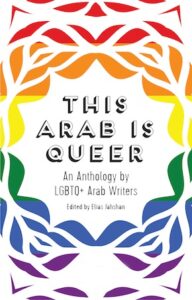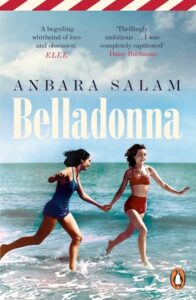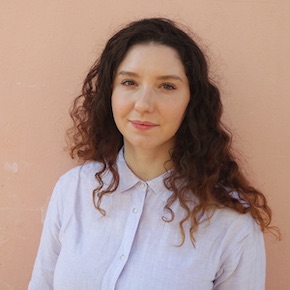Unheld conversations
by Anbara Salam
“A wonderful collection of stories, of people unshackled, of tongues untied… Profoundly moving and uplifting.” Rabih Alameddine
Just before my second novel, Belladonna, was published in 2020, I gave each of my parents an advance proof copy. They had both read my first book at a much earlier stage in the publishing process, when I was still working on edits. This time, the novel was just weeks away from being made available to the public.
Belladonna is far from autobiographical. It is set in the 1950s and most of the story takes place in a silent convent in northern Italy, a place I have never even been. But unlike my first novel, Belladonna is written in the first person, and the narrator is a queer Arab woman. The book is about the pain and toxicity experienced by the narrator, who has a particular kind of obsession with another woman; the kind of obsession that only a young woman who hasn’t come to terms with the force of her own longing can experience. The plot revolves around a love triangle between three women.
And so, as I handed over the soon-to-be-published book to my parents, it was with a certain amount of anticipation, maybe trepidation. I left them to read the novel and waited for the conversation about my sexuality that we had always avoided. Both of my parents read the book. We never had a conversation.
The special flavour of disappointment I felt is hard to express. It was a snaky, unreliable kind of relief that comes with an anticlimax – as if a taxing and baroque examination had been cancelled at the last minute. Yes, the terror of facing this confrontation had been removed, but I’d prepared, I was ready. The fight music was playing but the match was called off, and I had to walk away and get a coffee instead.
I went over the reasons we might not talk about the book. We’d had many conversations about which parts of my first book, Things Bright and Beautiful, a historical fiction novel about missionaries in the South Pacific, were ‘real’ and which were invented. This is a common conversation for novelists, often to the point of frustration. Friends and family get a peculiar kind of validation from the process of sifting nuggets of reality from imagination. They determine who characters are actually based on, insisting that you have depicted identifiable incidents. A few months ago I read with some bafflement an email from an acquaintance who declared that ‘of course’ they recognised conversations in Belladonna as their own musings. This person hadn’t even crossed my mind in years. So why was I preoccupied by the lack of interrogation about my second book? It was hypocritical and narcissistic for me to want someone else to battle out the dividing line between my authorial voice and real-life experience.
In a large, rowdy, nosy Arab family, every minor life decision is passed between an extended network of loved ones who make it their personal mission to frolic in your business. But apparently my identity wasn’t worthy of the same fuss.”
My straight friends were especially baffled by my distress. Surely it was a good thing that my parents had avoided a conversation about queerness? The book was out, no one had said anything, which they encouraged me to take as a tacit form of acceptance, if not approval. I was in a relationship with a man at the time so why, they reasoned, was it even bothering me? I felt a gathering accusation: I was experiencing a millennial, self-indulgent kind of angst about a harmless kind of erasure. But in a large, rowdy, nosy Arab family, a change in hairstyle is fodder for teeth-sucking, cigarette-waving phone chains. Every minor life decision, every petty complaint about a colleague, every pound of weight fluctuation is inspected and eye-rolled, gossiped and rehashed, passed between an extended network of loved ones who make it their personal mission to frolic in your business. But apparently my identity wasn’t worthy of the same fuss. I’d expected a fuss. I was owed a fuss.
Withheld conversations about queer identity are an integral, load-bearing part of Arab culture. And for many queer Arabs, these withheld conversations serve us. They serve us structurally: by providing shields that, in many places, literally save lives from legal and social censure. They invite convenient amnesia, avert judicious eyes, swallow tuts at the back of the throat. They form a screen around particular bars in Beirut, a discreet bookshop in Cairo. Thanks to withheld conversations, our relationships with our grandparents can continue, with a manageable amount of intergenerational disorientation and judgement. The absence of conversations about queerness are the best-case scenario for those who are unable to offer their acceptance; the most they can do is clear a blank space on a map and stand at the edges, looking the other way.
In the diaspora, unheld conversations about sexuality are tangled up with other forms of unutterable discourse about identity. I’m one of those diasporic Arabs who enjoys a special kind of privilege from the benefits of these overlapping silences, something that produces, as it does with all privileged people, a miasma of guilt and self-doubt, a nauseating, tedious, third-culture self-analysis that is in danger of resulting in heavy-handed poetry about pomegranate seeds. The particularly grotesque identity twist is found where straight passing meets white passing. As a pale and unaccented Palestinian living in the UK, I’ve had inside access to spaces where it has been a savage pleasure to rip off the cloak and challenge people on their unfiltered racism and homophobia. I’ve also sat, sweating in that cloak, and shamefully said nothing. Nothing.
Silence is an incomplete metaphor. It can’t capture frustration and complicity, its function as retreat and a burrow. It holds a place for concealment, secrecy and deception. It holds a place for reverence. Living with a profound layer of silence wedged between yourself and your family can be such a source of sorrow, even when it is necessary.
In Arabic, designations for family members are precise. There’s vocabulary to describe a nephew on your mother’s side, in a way that English doesn’t permit. And those boxes on the family tree assign roles that serve social functions, functions that come with certain obligations. To wish to be known beyond the category of sister, uncle, niece, is to insist on a level of intimacy that rattles the containment of the box. My role as the eldest daughter of an Arab family carries with it duties and responsibilities that do not allow space to articulate individual desires, never mind ‘transgressive’ ones.
Eldest daughters of Arab families are expected to uncomplainingly contain the emotional needs of others, and quietly manage the practical labour of caretaking. It requires being a vessel into which responsibilities are poured; you must become a resting place for squabbles, disappointments and frustrations for both the older generations and younger relatives. You must also be a bridge between these generations, interpreting, shielding, arbitrating and negotiating. You must not take up space, make demands, need ministration. The eldest daughters of Arab families are expected to shelve our whims, keep our personalities confined so as to not use up emotional resources needed elsewhere. We are not supposed to be unusual, unexpected. It is a role expected to be performed in silence.
Avoidance is a learned tactic; it comes from experience. We hone it over time, we create grooves to fall into, which hold us in place to prevent collision.”
Strategic silence provides a protection and a defence for many queer Arabs. But the cost of that barrier is to accept that those closest to you do not really know you, and that feels especially alienating when the love-language of your culture is intrusion. It means leaving unshared all the messy, low-level melodrama of relationships, friendship fallouts, disappointments, celebrations, milestones, anniversaries. It means withholding the joyous ways you are reflected in your chosen and found family.
 This causes a particular kind of compartmentalisation, a simultaneous duplicitousness. It forces you to shuffle between your selves, only revealing part of your interiority at one time. It is living as a zoetrope, flickers of selfhood in a constantly moving drum. And to reconcile both Arabness and queerness carries with it enculturated resistance that, to feel secure, you must have the boundaries around these different selves locked down. It is difficult to break out of this compartmentalisation in a way that doesn’t feel profoundly unsafe. And this means living in a pattern of self-censorship and evasion.
This causes a particular kind of compartmentalisation, a simultaneous duplicitousness. It forces you to shuffle between your selves, only revealing part of your interiority at one time. It is living as a zoetrope, flickers of selfhood in a constantly moving drum. And to reconcile both Arabness and queerness carries with it enculturated resistance that, to feel secure, you must have the boundaries around these different selves locked down. It is difficult to break out of this compartmentalisation in a way that doesn’t feel profoundly unsafe. And this means living in a pattern of self-censorship and evasion.
As I wrestled with the strange grief of the withheld conversation that I was so sure Belladonna would instigate, I thought more about my novel. Why had I set a queer story in a silent convent in the first place? Was that some sort of clumsy way to process my own situation? As a child, we lived close to a silent convent, and I heard the bells calling the nuns to prayer in the morning. It mesmerised me: the idea of a community of women, living without words, in the centre of London. It seemed so ethereal, so magical, that I could get off the bus from the big Sainsbury’s and stand outside a cloistered community of silent women. The sheer otherworldliness of it enchanted me, and I buried the idea away to fictionalise later. My novel relied on the sisters’ silence as a queer love story unfolded in their midst; perhaps it did reflect something I’d unintentionally expressed. Maybe my context for understanding queer love was in a wider frame of avoidance.
Avoidance is a learned tactic; it comes from experience. We hone it over time, we create grooves to fall into, which hold us in place to prevent collision. Most of the Arab families I know are positively enthusiastic about emotional squabbles, operatic altercations, overblown, multicoloured disagreements with labyrinthine sub-plots. But true confrontation has consequences; it exposes and reveals. Since risks of those revelations often outweigh the rewards, silence is simpler, until it becomes habitual.
I have a memory of my mother, standing at the playground gates at the end of the school day. I was about ten and in my final year of primary school. Even through the window, I could see her face was stormy, and I dawdled in the corridor, sensing danger. Then I spotted it: there, in her hands, was my diary. It was one of those flimsy lock-and-key concoctions, a device much coveted among primary-school girls in the 1990s. It promised a loyal confidante, a reliable, discreet companion who would faithfully preserve my youthful hopes and dreams. That day, looking at the smashed lock mechanism in my mother’s grip, I recalled with horror and shame, the secrets I had spelled so poorly within: a maths test I’d cheated on, a scarf that I’d stolen from the lost-property box. Wielding the diary, my mother marched to the supervising teacher, and demanded that I confess my latent crimes on the spot, or she would read aloud from the diary and expose me as a criminal. Dutifully, I confessed. It was a tearful walk home.
As an adult, I can recognise this as an unnecessarily public moment of parental theatre. It was intrusive in a way that rendered me paranoid for many years: I never kept a diary again. But I also recognise the determined interest it took to smash through the lock on a book of my secrets. The same determination it now takes to look away.
from This Arab is Queer (Saqi Books, £12.99)
 Anbara Salam is a Palestinian-Lebanese-Scottish writer who grew up in London. She has a PhD in Theology and is now living and working in Oxford. She is the author of Things Bright and Beautiful (Fig Tree/Penguin, 2018) and Belladonna (Fig Tree/Penguin, 2020).
Anbara Salam is a Palestinian-Lebanese-Scottish writer who grew up in London. She has a PhD in Theology and is now living and working in Oxford. She is the author of Things Bright and Beautiful (Fig Tree/Penguin, 2018) and Belladonna (Fig Tree/Penguin, 2020).
penguin.co.uk
anbarasalam.com
@anbara_salam
Read our interview with Anbara about Belladonna
This Arab is Queer, edited by Elias Jahshan, is a groundbreaking anthology featuring the searingly honest and moving memoirs of eighteen queer Arab writers – some internationally bestselling, others using pseudonyms. Heartwarming connections and moments of celebration are presented alongside essays exploring the challenges of being LGBTQ+ and Arab.
Read more
@Elias_Jahshan
@SaqiBooks

